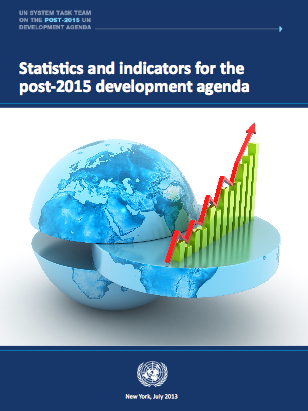The UN Task Team on the Post-2015 Development Agenda's (UNTT) Working Group on Monitoring and Indicators has launched a report on “Statistics and indicators for the post-2015 development agenda,” in Geneva, Switzerland.
The report discusses indicators for emerging post-2015 themes, including on disaster risk and resilience, governance and human rights, inequality, population, rule of law, sustainability and well-being.
 4 July 2013: The UN Task Team on the Post-2015 Development Agenda’s (UNTT) Working Group on Monitoring and Indicators has launched a report on “Statistics and indicators for the post-2015 development agenda,” in Geneva, Switzerland. The report discusses indicators for emerging post-2015 themes, including on disaster risk and resilience, governance and human rights, inequality, population, rule of law, sustainability and well-being.
4 July 2013: The UN Task Team on the Post-2015 Development Agenda’s (UNTT) Working Group on Monitoring and Indicators has launched a report on “Statistics and indicators for the post-2015 development agenda,” in Geneva, Switzerland. The report discusses indicators for emerging post-2015 themes, including on disaster risk and resilience, governance and human rights, inequality, population, rule of law, sustainability and well-being.
The report notes challenges posed by goals that integrate economic, environmental and social objectives for sustainable development, and proposes sustainability indicators from a subset of poverty-social-environment indicators.
The report highlights lessons learned from MDG monitoring, underlining the need for: a broad-based, inclusive and technical monitoring group and an annual report on progress and challenges; investments in country capacities for data collection and reporting; and well-defined, measurable indicators that can track country progress and be aggregated to show regional and global trends. The report recommends the continuation of the Inter-Agency and Expert Group on MDG Indicators (IAEG) in the post-2015 framework.
On numerical target setting, the report proposes balancing ambition with realism and ensuring clear, concise, results-oriented targets that can be objectively measured. The report suggests global targets for global monitoring and country-determined targets tailored to country specific development agendas. On indicators, the report proposes, inter alia: outcome indicators that are clearly linked to targets, measurable over time and easy to communicate; national indicators aligned with national development strategies; and consistency of statistics used for indicators. On statistical infrastructure, the report notes that technology-based innovations are changing how national and international statistical services collect, process and disseminate statistics. It discusses priorities for building national statistical capacities, including by addressing gaps in national capacities.
The UN Department of Economic and Social Affairs (DESA) and the UN Development Programme (UNDP) prepared the report in cooperation with the IAEG. [Publication: Statistics and Indicators for the Post-2015 Development Agenda] [DESA Press Release]